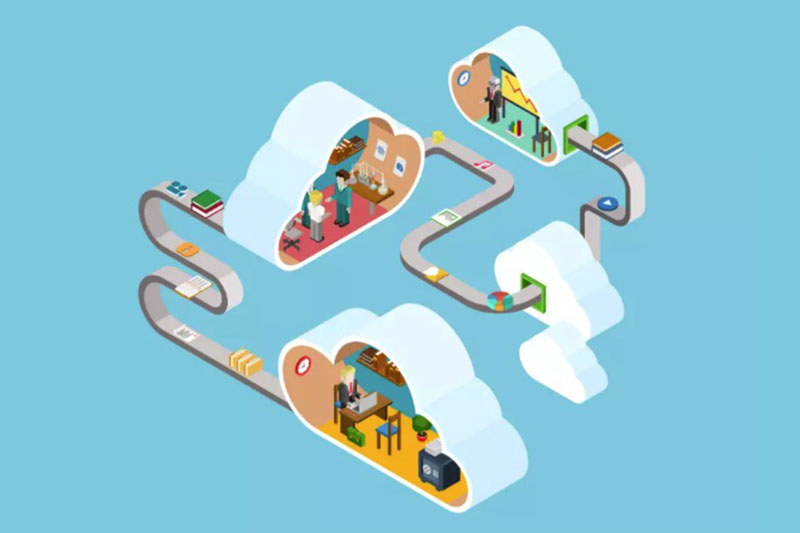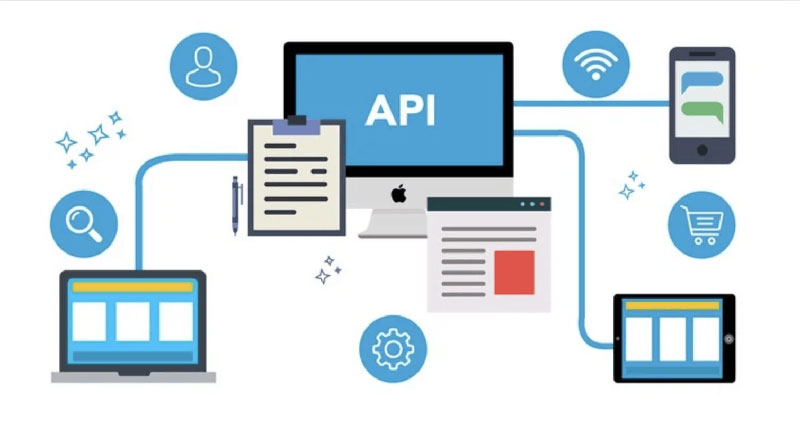What is an API and how important is it to your online business?
You have probably read or heard someone mention the term API before. It is often used by companies when talking about an application, operating system or website.
APIs are used everywhere in today’s digital world and offer tremendous benefits for users and businesses, but have you ever wondered what an API really is, or how to use it?

What is an API?
An API (Application Programming Interface) is a set of functions that allows applications to access data and interact with external software components, operating systems or microservices.
To simplify, an API provides a user response to a system and sends the system response back to the user. For example, you are on a website and click on “add product to cart”; an API tells the site that you have added a product to the cart; the website places the product in your cart and it is updated.
The API allows a developer to make a specific “call” or “request” to send or receive information, or to take a defined action, such as updating or deleting data.
Common examples of APIs
The API helps developers to provide information quickly to users and is used every day in the digital world in which we live. Each time you visit an online page, you are interacting with the API.
Didn’t understand how? Take a look at the examples we have listed below:
Going to a bank
Think of you as a customer and a bank teller as an API, while the bank is the system with which you interact. When you want to withdraw some money from your account, go to the cashier (API) and say “I would like $ 1,000 from this account”. The cashier (API) then goes to the bank manager (the system) and says “Mr. / Mrs. X would like $ 1,000”, the bank manager (the system) gives the cashier (API) $ 1,000 that he delivers to you.
As you can see, the API is a messenger between your needs and the system.
Looking for hotels, restaurants, car repair shops …
When you access a travel site, it can be linked to 10 other travel sites to find the best deal for you. When you enter details like Rio de Janeiro, 2 nights, 1 room, you send this request to these 10 different sites. The API takes your request for that specific location, date range and pinges the 10 sites, which send back the offers they found. Again, the API is a messenger for your requests.
Now think that the same thing happens when you search for restaurants in the vicinity of a hotel, search for car repair shops in a certain region, and so on.
Finding a Facebook profile
Thanks to the APIs you can find someone in the world that is a social network. If you type “Jack Wilson” on Facebook, the API tells the platform servers that you are looking for Jack Wilson. Facebook then sends you a list of all the profiles that match that name considering factors such as proximity or mutual friends, to optimize the results.
The same happens when you search for a specific news or topic on any social network.
Know the weather forecast
With weather APIs and smartphones with built-in GPS, you can have access to hour-by-hour forecasts, severe weather alerts, and other relevant weather information for just about every place you go.
Did you notice how the countless APIs that we don’t even know exist make our lives easier every day?
– How to use social networks to sell courses on the internet
Why do websites use APIs?
APIs offer a wide range of benefits for websites of all types. They can help consumers find products easily, develop a company’s brand, or even expand their earning potential by selling products across multiple markets and platforms.
Here are some reasons that explain why the API is so important for websites today.
Security
APIs strengthen the security of a website. Whenever you send a request, you aren’t directly linked to a server. The API delivers the information you send and the server sends it back.
This minimizes the risk of a breach or someone’s access to a server’s back end.
Speed
Without APIs, you would have to call a store and ask them to look at the stocks of all the suppliers of a product you want to purchase, for example. An API does this automatically, allowing you to quickly know if the product is available, value, etc.
The same happens in several other types of systems, allowing quick consultation of data from different sites, to improve the response to the user and facilitate internal management.
Scalability
The APIs allow scalability and flexibility when expanding your website’s catalog, security or data needs.
Your online business can grow at a faster rate when you don’t need to consider new code for each product, service or user.
What are the most used API types?
There are 3 types of APIs commonly used today:
- Open API
- Partner API
- Private API
Open APIs are publicly available for anyone to use. E-commerce platforms usually offer several APIs for public use, to facilitate integration with the most diverse online stores.
Partner APIs are designed by companies to offer API access to strategic business partners as a systems integration channel for both parties. For example, Coursify.me can offer a partner API to allow its customers to integrate their CRM with the platform, to allow the registration of employees to our system.
Private APIs are designed for internal use. Let’s say you are traveling to a city for a business meeting. You need to pay a quick visit to the bank. You enter “Banco ABC” and give the cashier your account number. She quickly opens your account and you make a withdrawal. The cashier was able to pull your information using ABC’s internal system, which uses an API to pull your account information and update your new balance.
Common APIs in Online Businesses
The APIs of sales platforms are used in several ways. From displaying products in an online store to shipping them all over the world.
APIs help owners manage their online businesses and connect with customers quickly and reliably.
Here are some examples:
- Product information APIs: They are on all e-commerce sites, obtaining product information and presenting it to customers.
- Website search APIs: The search system of a website needs an API to search for all products that fit a given query and send the results to the user.
- Payment APIs: If your online company collects any form of electronic payment, you are using a payment API as an intermediary between your website and your processor.
- Currency conversion APIs: Buying a US online course used to be difficult, now with a currency conversion API you can do that in an instant.
– Quick guide to online payment systems
Why use a custom API solution?
Built-in integrations, such as those available in the application market, are great tools. However, there are times when personalized integration is simply better for business.
Custom integrations offer an added bonus over pre-built applications, the control. They are customized according to the specific needs of your business, partner or customer.
Let’s say you’re using a CRM on your site and need to integrate it with a partner site to make managing employees and customers easier. This is where a custom API solution makes sense because it demonstrates the adaptability of composable architecture, meeting the specific integration needs.
There is no point in dealing with the hassles and headaches that come with using a different system just because it is already integrated. You don’t have to do things like train employees to use a new system, worry about transferring important data between systems, etc.
With the help of the API, you can still use your current system, while having the information automatically synchronized between your site and that of the partner.
APIs on eLearning platforms

API is a powerful tool that can help accelerate your business operations, increase your brand reach, connect your customers to the products they want and more.
Integrations into elearning platforms save time, reduce manual tasks, and offer greater range and depth of data, reports and insights. Here are some of the benefits of connecting through an API integration:
- Helps administrators to automate tasks;
- Maximizes the instructor and student experience;
- Creates an access login for different instructors from an online school;
- Adds / removes users when they are no longer in the HR system or on the payroll;
- Triggers invoices when modules are accessed, reducing the time it takes to do this manually.
Coursify.me is an eLearning platform that enables integration with existing software of partners. We have an API for obtaining course information and we can develop at no cost any other API needed to integrate your company’s software with our platform.
Complete hosting platform for online courses, Coursify.me allows integration with different websites, such as social networks and content hosting channels, helping to improve and promote your course.
Serving businesses and professionals in more than 60 countries, Coursify.me is a dynamic and customizable Learning Management System (LMS).
– Learning Management System: What is it?
The platform offers three plan options for you to decide which best suits your needs.
To learn more, visit our website, test the platform and understand why we are the best option for your online course.

